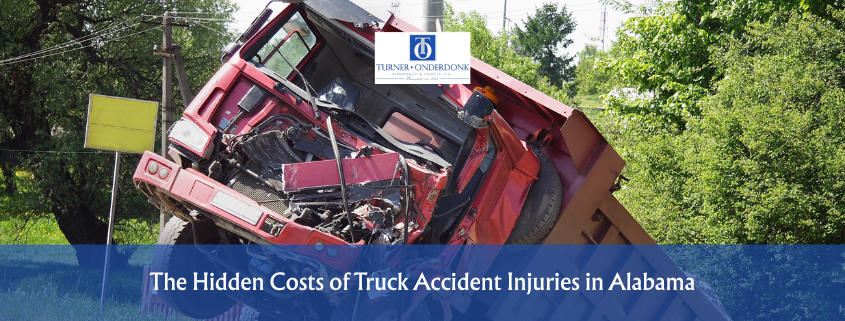The Hidden Costs of Truck Accident Injuries in Alabama
The immediate aftermath of a collision with a large commercial truck is a scene of jarring violence and confusion. Your first thoughts are about survival, the well-being of your passengers, and the immediate, visible damage to your vehicle. The initial expenses—ambulance rides, emergency room visits, and the initial estimate for car repairs—are tangible and overwhelming. But these upfront costs are often just the tip of the iceberg. The true price of a serious truck accident in Alabama unfolds over months and years, revealing a cascade of hidden costs that can impact every facet of a victim’s life.
What Are the Immediate vs. Long-Term Financial Burdens?
The financial strain of a truck accident begins the moment the collision occurs and can persist for a lifetime. While insurance may cover a portion of the initial bills, victims are often left navigating a maze of expenses they never anticipated.
Initial Economic Impacts: These are the most obvious costs that surface in the days and weeks following the crash.
- Emergency Medical Care: The costs for ambulance transportation, emergency room treatment, diagnostic imaging like X-rays and CT scans, and initial hospitalization can be substantial.
- Vehicle Repair or Replacement: The sheer force of a commercial truck often results in a passenger vehicle being declared a total loss. This leaves victims needing to replace their car while potentially still owing money on the damaged one.
- Immediate Lost Wages: Taking time off from work for initial recovery is a necessity, leading to an immediate loss of income that can put a strain on household budgets.
Projected and Future Economic Damages: This is where the true, often hidden, financial toll becomes apparent.
- Ongoing Medical Treatment: Recovery from serious injuries is a marathon, not a sprint. Future costs can include surgeries, physical and occupational therapy, pain management specialists, prescription medications, and necessary medical equipment like wheelchairs or home modifications.
- Loss of Future Earning Capacity: A debilitating injury can permanently alter your ability to perform your job or work at all. This represents a significant financial loss over the course of a lifetime, impacting not just your income but your retirement savings and ability to provide for your family.
- Vocational Rehabilitation: If you are unable to return to your previous profession, you may require vocational training or education to learn new skills for a different line of work.
- Home and Vehicle Modifications: Permanent injuries may necessitate changes to your living environment, such as installing wheelchair ramps, grab bars, or a walk-in shower. Your vehicle may also need to be adapted for hand controls or other accessibility features.
- In-Home Care: Severe injuries can leave victims requiring assistance with daily activities like bathing, dressing, and meal preparation, necessitating professional in-home nursing or personal care services.
How Do Non-Economic Damages Affect an Injury Victim’s Life?
Not all losses can be calculated with a receipt or an invoice. These non-economic damages, while intangible, represent the profound human cost of a truck accident. They address the ways an injury diminishes your quality of life.
Pain and Suffering: This compensates for the physical pain and discomfort endured from the moment of the accident through a long and often arduous recovery. It accounts for the daily reality of living with chronic pain.
Emotional Distress and Mental Anguish: The psychological trauma from a violent collision can be as debilitating as any physical injury. Victims commonly experience:
- Anxiety and depression.
- Post-Traumatic Stress Disorder (PTSD), which can manifest as flashbacks, nightmares, and severe anxiety.
- A persistent fear of driving or even being a passenger in a vehicle.
Loss of Enjoyment of Life: A serious injury can rob you of the ability to participate in hobbies and activities that once brought you joy. This could be anything from playing with your children and walking your dog to golfing, gardening, or traveling. This loss is a significant component of your damages.
Permanent Scarring and Disfigurement: Visible scars can be a constant, painful reminder of the trauma you endured. They can affect self-esteem and confidence, fundamentally altering how you see yourself and interact with the world.
Loss of Consortium: A catastrophic injury doesn’t just affect the victim; it impacts their entire family. Loss of consortium is a claim that can be brought by a spouse for the loss of companionship, affection, and intimacy that results from the other spouse’s injuries.
Why Is Establishing Liability So Complicated in Trucking Cases?
In a standard car accident, liability often rests with one driver. In a commercial truck accident, the picture is far more complex. Multiple parties could share responsibility for the collision, and identifying all of them is a key step in ensuring full compensation for your extensive damages.
- The Truck Driver: Driver error is a frequent cause of accidents, stemming from factors like fatigue, distraction (such as cell phone use), speeding, or driving under the influence.
- The Trucking Company (Motor Carrier): The carrier has a duty to hire qualified drivers, ensure they are properly trained, and comply with federal safety regulations. They may be liable for negligent hiring, poor training, or pressuring drivers to violate hours-of-service rules designed to prevent fatigue.
- The Maintenance Provider: If a mechanical failure, such as brake failure or a tire blowout, caused the accident, the company responsible for inspecting and maintaining the truck could be held liable.
- The Cargo Loader: Improperly loaded or secured cargo can shift during transit, causing the driver to lose control or the truck to overturn. The company that loaded the trailer could bear some responsibility.
- The Manufacturer: In some cases, a defective truck part or a faulty vehicle component can be the root cause of the crash, leading to a product liability claim against the manufacturer.
A thorough investigation often requires obtaining and analyzing evidence like the driver’s logbook (or electronic logging device data), the truck’s maintenance records, and information from the vehicle’s “black box” (event data recorder).
How Does Alabama’s Contributory Negligence Rule Impact My Claim?
Alabama operates under a legal doctrine known as “pure contributory negligence.” This is an unforgiving rule that has a profound impact on personal injury claims.
Simply put, if you are found to be even 1% at fault for the accident that caused your injuries, you are barred from recovering any financial compensation from the other at-fault parties.
Trucking companies and their insurers are keenly aware of this rule. Their adjusters and defense attorneys will work diligently to find any piece of evidence that can be used to shift even a tiny fraction of the blame onto you. They might argue you were following too closely, that one of your brake lights was out, or that you failed to signal a lane change properly. Because of this harsh standard, it is vital to be cautious in your communications with insurance companies and to avoid any statements that could be misconstrued as an admission of fault.
What Is the Legal Process for a Truck Accident Claim?
Navigating a truck accident claim involves a series of formal steps, each one requiring careful attention to detail and a deep familiarity with legal procedure.
- Investigation and Evidence Gathering: This is the foundation of the entire claim. It involves collecting the police report, witness statements, medical records, and crucial evidence from the trucking company.
- Filing the Claim: A formal claim is presented to the appropriate insurance companies, outlining the facts of the case and the nature of your damages.
- Negotiation: An attorney will negotiate with the insurance adjusters, presenting a detailed demand package that documents all of your economic and non-economic losses. This phase can be lengthy and contentious.
- Filing a Lawsuit: If the insurance company refuses to offer a fair settlement, it may be necessary to file a lawsuit. This initiates the formal litigation process.
- Discovery: During litigation, both sides exchange information through depositions (sworn testimony), interrogatories (written questions), and requests for documents.
- Settlement or Trial: The vast majority of cases are resolved through a settlement before reaching a courtroom. However, if a fair agreement cannot be reached, the case will proceed to trial, where a judge or jury will determine the outcome.
It is important to remember that Alabama has a statute of limitations, which is a strict deadline for filing a personal injury lawsuit. Generally, you have two years from the date of the accident to file. Missing this deadline will result in losing your right to seek compensation forever.
How Can Legal Guidance Help Me Navigate This Process?
Facing the aftermath of a serious truck accident is daunting. The physical recovery, emotional trauma, and mounting financial pressures can be overwhelming. Attempting to also take on a large trucking company and its aggressive insurance carrier alone can put your rightful compensation at risk.
An experienced law firm can manage every aspect of your claim, allowing you to focus on your health and your family. This includes:
- Conducting a comprehensive investigation to secure all available evidence.
- Identifying all potential at-fault parties to maximize your potential recovery.
- Working with medical and economic professionals to accurately calculate the full extent of your lifetime damages.
- Handling all communications and negotiations with insurance companies.
- Navigating Alabama’s complex legal system and its strict contributory negligence standard.
Injured in an Alabama Truck Accident? Contact Turner, Onderdonk, Kimbrough & Howell, P.A. for Assistance
The hidden costs of a truck accident can create a lifetime of challenges. If you or a loved one has been injured in a collision with a commercial vehicle, you do not have to face this difficult journey alone. The legal system provides a path to hold negligent parties accountable and secure the financial resources necessary for your recovery.
The attorneys at Turner, Onderdonk, Kimbrough & Howell, P.A. are dedicated to helping injury victims across Alabama. We have the knowledge and resources to take on complex truck accident cases and fight for the full and fair compensation our clients deserve.
We invite you to contact us at (251) 336-3411 for a free consultation to discuss your case and learn how we can help protect your rights and your future.



Leave a Reply
Want to join the discussion?Feel free to contribute!